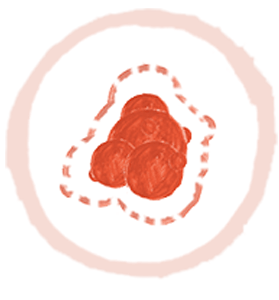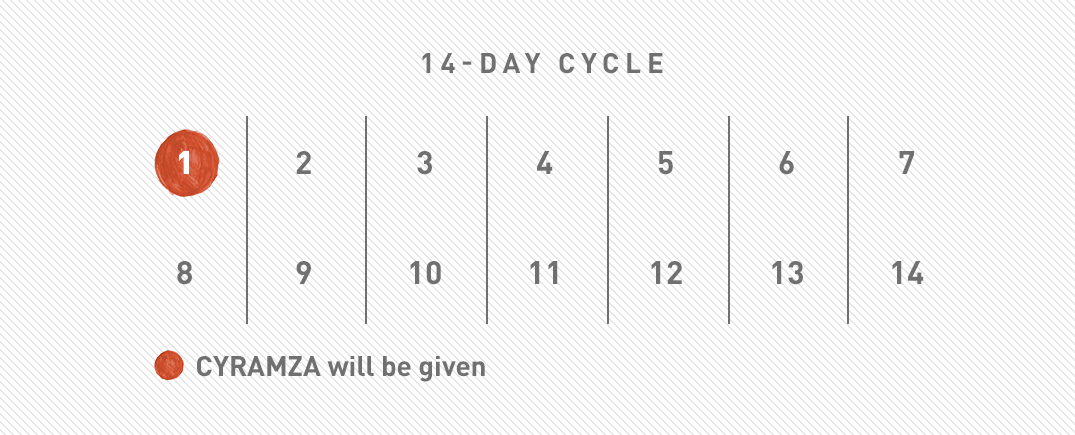
When living with EGFR mutation-positive metastatic non-small cell lung cancer (mNSCLC)...
CYRAMZA may help you fight for what matters to you
You’re not the type to settle for average. You’re the type who pushes for more. But where individual results with CYRAMZA can vary, clinical studies have shown...

More time without disease progression
In a clinical study, CYRAMZA + erlotinib provided more time without disease progression than placebo + erlotinib for people with metastatic NSCLC with certain types of EGFR mutations.
- On average, people taking CYRAMZA + erlotinib lived 19 months without disease progression compared with 12 months for those taking placebo + erlotinib
The clinical study is still ongoing to determine if CYRAMZA + erlotinib may help you live longer compared with placebo + erlotinib.

People had tumor shrinkage
In a clinical study, tumors shrank* in 76% of people taking CYRAMZA + erlotinib compared with 75% of those taking placebo + erlotinib.
* The percentage of patients who experienced tumor shrinkage was similar between those taking CYRAMZA + erlotinib compared with those taking placebo + erlotinib. Tumor shrinkage is defined as a reduction of 30% or more in tumor size.
CYRAMZA + erlotinib was studied in a clinical trial for the initial treatment of people with metastatic NSCLC with certain EGFR mutations. Of the 449 people included in the trial, 224 people received CYRAMZA + erlotinib and 225 people received placebo + erlotinib.
The trial was designed to measure disease progression, which is the time that people lived without their cancer spreading or growing after taking treatment. The study also measured the proportion of patients who had a reduction in tumor size of 30% or more.
SELECT SAFETY INFORMATION
CYRAMZA may cause serious side effects, including:
Severe bleeding, including bleeding in the stomach or bowel, has happened with CYRAMZA. This can be life threatening. Tell your doctor right away if you have bleeding or symptoms of bleeding, including lightheadedness. If severe bleeding happens, you will have to stop receiving CYRAMZA.
What to expect during treatment
CYRAMZA is given by intravenous infusion, commonly referred to as an IV. A doctor or nurse will administer treatment at the doctor's office, a hospital, or an infusion center.
Your first infusion will take about 60 minutes. If you tolerate the first infusion of CYRAMZA well, then your next CYRAMZA infusions may take 30 minutes.
Before you receive CYRAMZA, your doctor will give you different medicines to help prevent an allergic reaction that may occur during the infusion.
CYRAMZA is given in combination with erlotinib, a daily tablet.
Understanding your dosing schedule with CYRAMZA

CYRAMZA will be given to you once every 2 weeks, or as recommended by your doctor. Your doctor will determine the number of treatments you receive.
SELECT SAFETY INFORMATION
CYRAMZA may cause serious side effects, including:
Reactions related to infusing CYRAMZA have happened. These can be severe and life threatening. Most of these reactions happened during or after the first or second CYRAMZA infusion. Symptoms of infusion reactions include shaking or stiffness of the body, back pain or spasms, chest pain or tightness, chills, flushing (sudden warmth and/or reddened skin on the face, neck, or upper chest), difficulty breathing, wheezing (a whistling sound in the breath caused by narrowed breathing tubes), becoming blue due to lack of oxygen, and tingling or numbness of the skin. In severe reactions, rapid heartbeat, low blood pressure, and severe trouble breathing may happen. Your health care team will give you medicine before each CYRAMZA infusion and will watch you for these side effects. If a reaction happens, CYRAMZA treatment may be infused at a slower rate or may be permanently stopped, depending on how severe the reaction is.
Tips for day of treatment and beyond
You may be nervous about your first treatment. Or maybe you're an old pro at this. But no matter where you're coming from, here are some important tips to help get you through each infusion with CYRAMZA:
Understanding common side effects
CYRAMZA in combination with erlotinib may cause side effects. If you experience symptoms while on treatment, it is important that you speak with your doctor.
Explore the most common side effects of CYRAMZA, below.
The most common side effects were:
- Infections
- Increased levels of liver enzymes
- Diarrhea
- High blood pressure
- Low red blood cell count
- A sore or inflammation inside the mouth
- Low blood platelet count
- Loss of hair
- Nosebleeds
- Too much protein in the urine
- Decrease in a type of white blood cell
- Low potassium in the blood
- Swelling in the arms, legs, hands, and feet
- Headache
- Gatrointestinal bleeding events
- Gums bleeding
- Bleeding in the lungs or respiratory tract
The most common serious side effects were:
- Pneumonia (infection in one or both lungs)
- Skin infection (bacterial infection under the skin)
- Collapsed lung (air or other gas in the pleural cavity in the lungs)
Talk to your doctor about any questions, concerns, or side effects you might have with CYRAMZA. Your doctor may be able to make recommendations to help you feel more comfortable.
You are encouraged to report negative side effects of prescription drugs to the FDA. Visit www.fda.gov/safety/medwatch or call 1-800-FDA-1088.
Please see Indications and Safety Summary below for more safety information for CYRAMZA.
